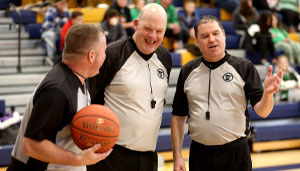- Home
- Sports Resource Content
- Patterning Core Values
Passionate fans can bring about pressing issues for a school and its respective athletic administrators. Be it schools small or large, fan bases possess those select few parents or students whose passion cannot be contained in an appropriate manner. The inability to do presents a challenge for students, who can often face as much scrutiny for it from individuals who aren’t coaching the team.
I viewed one such instance in March 2017, when Grand Forks Public Schools hosted the North Dakota High School Activities Association (NDHSAA) Class B Girls State Basketball Tournament. Class B is the larger of the two NDHSAA classifications. As a born and raised tiny town, Class B kid, I enjoy getting back into the Class B atmosphere when I can. While the folks associated with our two nearby Class A schools certainly care about their schools and their teams, it’s difficult to compare to the passion of North Dakota Class B fandom.
Along with that passion for the town’s athletic programs comes an extremely high level of “concern” about results. At last weekend’s tournament, my staff and I had front row seats to a pair of fans from one of the schools who spent three straight days yelling a constant barrage of negative comments, and I’m not using hyperbole. Those two had a negative comment for someone – refs, kids, coaches – on, literally, almost every single possession of their team’s entire tournament. While it was obvious that this school’s fan base has a severe culture problem – there were many fans in this section yelling criticism throughout the tourney, often so casually that it was apparent how accustomed these fans were to this behavior – these two fans still stood out among the crowd. It was bad enough on Thursday and Friday, that on Saturday, I noted two things that don’t normally happen when we host tourneys. First, people from other areas of the arena came over to where my staff was for the sole purpose of listening to these fans because they’d heard about how bad it was and, second, my staff was making predictions about how long into Saturday’s game we’d get before one of them yelled something at someone (they made it 25 seconds into the game).
I had two initial thoughts during and immediately after the weekend:
- Assuming those two were parents, what a terrible conflict they were putting the kids into. If a basketball team is doing what they are supposed to be doing, the players on the floor should be talking to each other during the game. The coach on the sideline was often instructing players during play. These poor kids had the two fans screaming another set of instructions at them. That’s three sets of instructions that these kids were trying to process at once. Beyond that, one thing that I’ve found to be true is that parents who yell at their kids during the game are usually the same parents who chirp their kids on the ride home, so think about the horrible conflict these two parents’ kids are being put into during the state tournament. If they listen to their parents, they risk being pulled from the game for not doing what the coach is telling them. If they listen to their coach, they’re going to have to deal with criticism from their parents after the game. That’s an awful, awful conflict for a 13- to 18-year-old to have as a result of playing a game.
- Is there any way that these two adults were having fun? I just can’t fathom a scenario where, as an adult, you show up to an event, yell and criticize for an entire game, then leave the arena thinking about how much fun you just had watching kids play. Think about it – whether these two are parents or just community fans, they spent money on gas, hotel, meals, and tickets to come to Grand Forks to yell at other people and complain for three days. Personally, I wouldn’t have any fun in that scenario.
After my initial two thoughts, I came across a wonderful coincidence of timing in our parent book study (Check it out if you haven’t already). We just posted discussion questions for Chapter 3 of John O’Sullivan’s book, Changing the Game: The Parent’s Guide to Raising Happy, High-Performing Athletes and Giving Youth Sports Back to Our Kids. Chapter 3 talks about setting a parental vision for who/what you want your kid to be in the future. The premise isn’t such goals as “I want my kid to be a state champ” or anything like that; it’s a future vision of the kid as an adult – a parent, a spouse, an employee, etc. The exercises in the book walk parents through defining their families’ core values then picturing their future children through those values. Of course, that vision leads to adjectives such as loyal, confident, courageous, hard working, dependable, etc. O’Sullivan then asks the simplest question that could be asked: “Are my actions today leading to this future person, or leading to something entirely different?”
Wow. So simple, yet so effective.
Applied to these two fans/parents specifically – assuming that they want their kids to grow up to have such qualities as referenced above, how does screaming “FOUL,” “HACK,” “GET HER OFF,” “CALL IT BOTH WAYS,” “MOVE AROUND, GIRLS,” “CHANGE YOUR PRESS BREAKER,” “SHE’S PUSHING,” “DRIBBLE,” “WHAT ARE YOU DOING,” etc., help their kids to learn those characteristics? I’m certain these parents thought they were helping by trying to sway the officiating, change the coaches’ mind, get kids to go where they thought the kids should be, etc., but does that help form the kid into that future vision? Couldn’t I argue that even if the officiating was horribly one-sided against this team (it wasn’t), wouldn’t dealing with that help teach the kid persistence and perseverance? Aren’t those good qualities for an adult to have?
Most parents/people will openly claim that they want their kids to learn all those noble personal characteristics through participation in sports, but do they then live and display those values for their kids during competition? Think about some of the negative behaviors associated with youth sports:
- What quality do kids learn when you yell at officials or coaches from the stands?
- What quality do kids learn when you’re yelling at the kids from the stands?
- What quality do kids learn when you criticize coaches or teammates in front of your kids at home or in the car?
- What quality do kids learn when you criticize the other team’s coaches or kids in front of your kids?
- Specific to a problem with some sports in Grand Forks – what quality do kids learn when you can’t seem to watch them play without drinking before and/or during their games?
Such a simple question – are my actions today leading to what I want my kid to be? It makes so much sense in theory, yet the passion around competitive athletics causes us to so quickly lose our core values. Remembering that this experience should belong to the kids, we can all do our part to be productive fans, too (Something I’ve speculated about before – found here). Keep things in perspective, and make sure your actions are matching that vision for your kid in the future.
Mark Rerick
Mark Rerick, CMAA, has been an athletic director since 2006. After spending time splitting duties at other schools as a teacher, coach and principal, he has been the full time athletic director for Grand Forks (ND) Public Schools since 2012.
Most Recent Articles
- nfhs news NFHS Celebrates National Girls and Women in Sports Day
- nfhs news NFHS Learning Center Delivers 25 Millionth Course
- Track & Field/Cross Country article Effective Communication with Athletes and Coaches
- nfhs news Player Equipment Changes Highlight 2025 High School Football Rules Revisions
- Player Equipment Changes Highlight 2025 High School Football Rules Revisions






